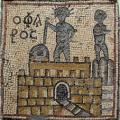96 - Dominic O'Meara on Neoplatonism
Posted on
Dominic O'Meara speaks with Peter about political philosophy and mathematics in Neoplatonism.
Themes:
Further Reading
• D. O'Meara, Pythagoras Revived: Mathematics and Philosophy in late Antiquity (Oxford: 1989).
• D. O'Meara, Plotinus: An Introduction to the Enneads (Oxford: 1993).
• D. O'Meara,The Structure of Being and the Search for the Good. Essays on Ancient and early Medieval
Platonism (Aldershot: 1999).
• D. O'Meara, Platonopolis. Platonic Political Philosophy in Late Antiquity (Oxford: 2003).







Comments
Dominic J. O'Meara Interview: RE: political philosophy
Dear Peter,
Very much enjoying the series. I esp. liked your most episode with Dominic J. O’ Meara, a name I well-recognize through my own plethora of readings on Neoplatonism (my personal perennial philosophy). On a point he brought up: that the ancients understood political philosophy as the community being a place where the individual can practice and attain virtue and happiness (in the Greek sense of the latter) which, he says is very much of a contrast to modern political philosophy. But, I wished Prof. O’Meara would have given a summary of what modern political philosophy is all about then by contrast. A bit unsure myself on how best to conceptualize it (except whatever it is--the ancient sense sure sounds preferable). Barring knowing Prof. O'Meara's precise take on this, how would you define this contrast?
Thanks!
Anticipating the next program on classical vs. Christian Neoplatonism!
Rhys (“rise”) OKC, OK
In reply to Dominic J. O'Meara Interview: RE: political philosophy by Rhys
Ancient vs modern political thought
Glad you are enjoying the series and this episode, which I in this case can agree was fantastic without sounding immodest! Obviously I can't speak for Prof O'Meara but in my own view, the distinction he made makes sense because at least in more-or-less liberal theories of justice/political philosophy, philosophers nowadays tend (I think) to operate with as thin as possible a conception of the human good. This is because they want to leave it open that different people will have different preferences, and should be allowed to make up their own minds about what would make them "happy". Indeed happiness in this newer tradition is often perceived as consisting in desire satisfaction, where desires may differ widely from person to person. The veil of ignorance/original position idea in Rawls is a good example: we should design a society without having any robust views about what our own values will be once we are in that society (e.g. we don't know whether we will turn out to be, say, religious, any more than we know whether we will turn out to be poor, a member of a minority, etc.). This is very much in contrast to the ancient tradition which begins with a very "thick" concept of the good and assumes that the right political arrangement would be one that leads everyone in the society towards that good.
Family and private property
There is a difference between private and personal property. And as shown by anthropological studies, families in the modern sense are not an universal characteristic of societies.
Add new comment